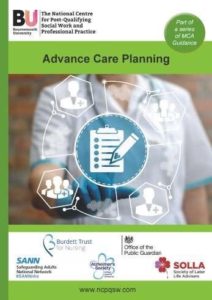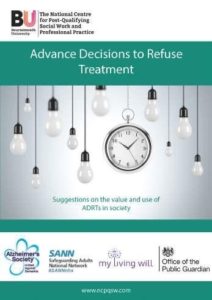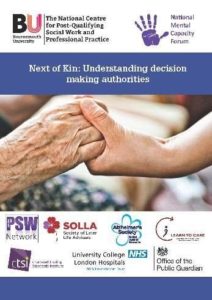Advance Care Planning and End of Life Care

Author: Ruth Preston
People in the fourth age (those over 80) may need support and encouragement to look forward and consider future decisions regarding their health, care, and potential or likely treatments. Whether the person is active, struggling with long-term conditions or is housebound or frail, making informed decisions regarding future care is important; encouraging people in the fourth age to discuss aspects of future care and even end-of-life care is one way to empower them, help them maintain control in their lives and feel comfort and peace that ‘things’ have been sorted and agreed.
Whilst most Christian faith organisations are not involved in the provision or delivery of medical care or treatments, pastoral support from the church can be important and helpful to many Christians, in the decisions for future care and treatment. People often need spiritual and pastoral support to talk through choices, wishes, and their own priorities for care. This support can help families have ‘difficult’ discussions and explore options available for future care, treatments, and care settings.
What is Advance Care Planning?
Advance Care Planning (ACP) is a way in which individuals can discuss and make clear their wishes and choices for treatment and care, which may become relevant at a future time when they lack the capacity to make decisions for themselves.
‘Advance care planning is a process that supports adults at any age or stage of health in understanding and sharing their personal values, life goals, and preferences regarding future medical care. The goal of advance care planning is to help ensure that people receive medical care that is consistent with their values, goals and preferences during serious and chronic illness.’ – International Consensus Definition of Advance Care Planning- 2017
Society is only just waking up to the need for advance planning for future care and treatment – arrangements such as Advance Care Planning, Lasting Power of Attorneys and Advance Decisions to Refuse Treatments have been in place for many years, but are only recently being put in place and seen in hospitals and other care settings. Whilst these future decision-making arrangements are relevant for all ages, they are particularly important for older people in the fourth age – for medical treatments and care arrangements such as hospital admission, urgent care and treatment, resuscitation, artificial life support, care home placement, and priorities for end-of-life care.
The crisis caused by the Covid-19 pandemic resulted in some illegal decision-making around decisions regarding resuscitation and hospital admission – with Advance Decisions being made in some care homes and some hospitals, without due consideration of the individuals’ wishes, views of families, or legal requirements. The lock-down measures required in the pandemic made it difficult for individuals and families to make considered and informed decisions regarding treatments at a time of crisis. Being supported by a Christian faith organization to prayerfully and honestly discuss decisions, consider options and make informed decisions regarding future care and treatments is therefore even more important at this time – and this will continue to be so for many years ahead.
Relevant Publications from the National Centre for Post-Qualifying Social work and Professional Practice:
 Advance Care Planning
Advance Care Planning
Supporting and encouraging individuals to look forward and consider the treatment and care they may require in the future is an increasingly important aspect of clinical care – in health and social care settings. Whether the person is in an acute hospital, community hospital/unit, care home or receiving care in their own home, practitioners need to be mindful of decisions individuals may need to make, or have made, regarding future care – for urgent treatments, such as resuscitation, acute treatments or priorities for end-of-life care visi: https://ncpqsw.com/publications/advance-care-planning/
 Advance Decisions to Refuse Treatment
Advance Decisions to Refuse Treatment
The Mental Capacity Act allows the person, if they have the capacity, to plan ahead for decisions about medical treatments, using a tool called an Advance Decision to Refuse Treatment (ADRT). This will only come into force once the person loses the capacity to make their own choices. It is important to note that ADRTs don’t support euthanasia or assisted suicide in any way – they refer to stopping life support and resuscitation, not the active ending of life.
Please note that often people refer to ‘Living Wills’. The MCA uses the term ADRT not Living Wills, so although they are very much the same thing we have used the MCA term – ADRT. You can find out more here: https://ncpqsw.com/publications/advance-decisions-to-refuse- treatment/
 Next of Kin: Understanding Decision-making Authorities
Next of Kin: Understanding Decision-making Authorities
By law, the term Next of Kin has no status when you are alive. This helpful leaflet clarifies how people can plan ways, with those they love, to ensure their wishes are taken in to account if, through illness, they cannot make decisions for themselves. You can find the information here: https://ncpqsw.com/publications/next-of-kin-understanding- decision-making-authorities/
Advance Care Planning may involve an individual making formal arrangements for decisions about their future care and treatment – such as:
Advance Statements of Preferences – set out the person’s choices about future care.
Lasting Power of Attorney for Health & Welfare
The appointed person(s) who are registered through an application process with the Court of Protection, to act legally on behalf of an individual in the future, when they lack the mental capacity to make their own decisions about care and treatment.
Advance Decisions to Refuse Treatments (ADRTs)
Define urgent care and treatments which the individual would not wish to have in the future, such as resuscitation, artificial ventilation, invasive surgical procedures. Treatments set out in a valid ADRT cannot legally be afforded to the individual.
Treatment Escalation Plans (TEP)
Set out clinical decisions agreed with the person and their GP or hospital doctor, such as Do Not Resuscitate, appropriateness of hospital admission, futility of high-tech treatments.
Recommended Summary Plan for Emergency Care and Treatment (ReSPECT)
Similar to TEP, in agreeing the relevance or desire for emergency treatment such as resuscitation and other forms of hospital care.
Priorities of Care
Often used to plan individual wishes for end-of-life care, including identification of preferred place of care, clarifying active treatments, priorities of focus of care, spiritual and religious aspects of care.
Individuals in the fourth age may well turn to leaders or others within the church, for advice, support and help in making any sort of advance care plans. Whilst information and advice may be needed from relevant clinical professionals, the process itself is simply a way of someone considering and setting out their choices, wishes and preferences for future care.
Church leaders and those involved in the pastoral care of a Christian faith organisation should be aware of the purpose and usefulness of advance care planning and create opportunities for people in the fourth age to seriously consider their wishes and plans for future care and treatments. Advance Care Planning should be actively encouraged – people in the fourth age should not think this is something nice to do in the future, rather a real necessity to do now. Everyone should be encouraged to make provision for Lasting Power of Attorneys, clarify Advance Decisions to Refuse Treatments and Treatment Escalation Plans – but for those people in the fourth age, there is a real urgency for these decisions. Members of Christian faith organisations are often in an ideal position to support and assist individuals wishing to make any form of decisions for future care and make known any decisions regarding medical treatments they would not want to have.
Case Study – Enid and Jack
Enid and Jack had been married for over sixty years, but Enid’s health was failing due to heart failure and diabetes and Jack struggled with his mental health and early signs of Dementia. Whilst Jack tried to care for his wife, they were both finding it a struggle to manage at home. They had no children, but Enid had a niece who helped them both with financial matters and organising of care and support at home. On returning from hospital, having fallen at home and breaking her hip, Enid asked her niece Denise to help her and Jack make plans for their future care.
Denise lived many miles away, but agreed to act as Lasting Power of Attorney for both Enid and Jack – and applications were made for LPAs for Property & Financial Affairs and for Health & Welfare. Both Enid and Jack discussed likely arrangements and care needs they both may have in the future, with Denise and appointments were made for them to discuss Treatment Escalation Plans with their GP – to record the fact that neither of them wanted to be resuscitated nor be admitted to hospital.
Enid and Jack were part of a local church and it was arranged for one of the Elders to be a contact point with Denise. Several of the church membership supported the couple at home, with practical help with shopping, gardening, cooking; they attended church services and social activities regularly – with help from members who gave them lifts and drove them to appointments, etc.
Over the next few months, as Enid’s health deteriorated, there were concerns by church members that Jack was not able to manage to care for his wife on his own, or able to look after himself. Denise liaised with the church Elder and arranged for regular care to be provided for Enid at home, referral to the local hospice team and discussion with Enid’s GP regarding End-of-life care; support was also arranged for Jack at home.
When Enid sadly died, Denise made all the arrangements for her funeral – supporting Jack with decisions needed, and liaised with the church elder. She arranged for him to stay in a local Care Home, which is something they had discussed with Denise, when she first took on the role of LPA – Jack now resides in the Care Home and has flourished with regular meals, good care and pleasant company. He admits that having Denise as his LPA made all the difference – “she just sorts everything out, so that I don’t have to worry” he reported. Jack still attends church on Sundays, with someone picking him up – and joins in with some of the seasonal events and regular activities – he remains very much part of the church and continues to be supported by the fellowship.
Reflection
- Who are the ‘Enids’ and ‘Jacks’ in our fellowship? Who is likely to need spiritual and pastoral support to think about the future care they may need?
- Which of our members have no-one locally to support them with decisions regarding future care and support?
- How can our church support and help families discuss ‘difficult’ decisions about future care, treatment and support?
- How can we encourage people to talk openly and freely about their wishes, choices and decisions about future care, treatment and support?
- What role can our church have in supporting people to be cared for how they wish and choose – in later life and towards the end of life?
© Professor Keith Brown from ‘Guidance for Christian Faith Organisations in the Support and Value of Older People’ available from Faith in Later Life
